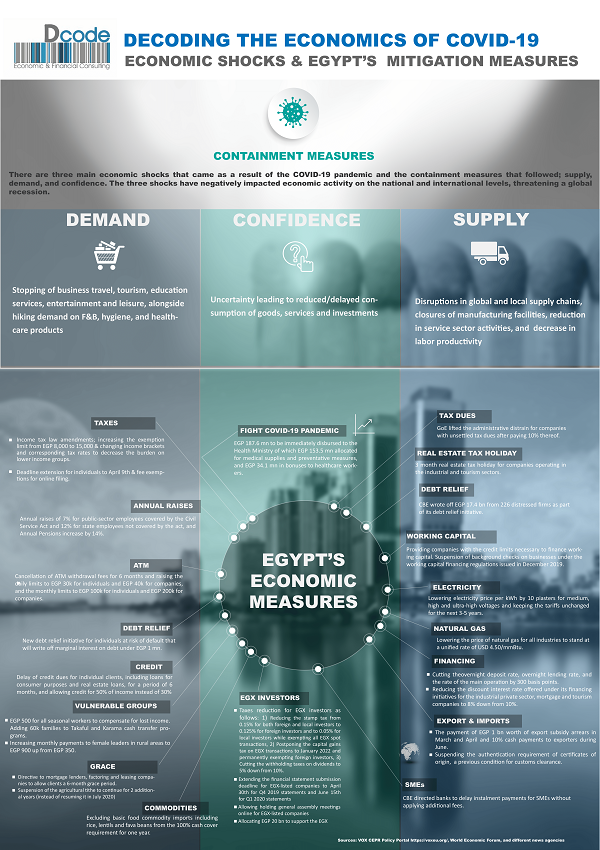Looking at Egypt, the below infographic developed by Dcode Economic & Financial Consulting by summarizes how the situation is forcing changes on the economy. Insights from Tarek Selim, Professor of Economics at the American University of Cairo’s School of Business explain how economies could survive the COVID-19 storm.

The past few weeks have indeed tested the emergency preparedness and response capacity of individuals, governments, institutions, businesses at all levels. It will be sooner than later that the massive impact the COVID-19 pandemic is leaving on the global economy will further manifest itself.
“This has been a global shock to the world economy at large, for every citizen of the world. It started as a demand withdrawal on travel & tourism, then followed itself by a lagged supply response. In the beginning, the travel & tourism sector were the most negatively affected, yet now the “ripple effect” on business supply is across all sectors,” said Tarek Selim, Professor of Economics at the American University of Cairo’s School of Business, and he added, “Unpredictably, there are sectors which can potentially gain from the coronavirus epidemic, namely IT marketing and digital business, and highly capital-intensive industries as well, as opposed to labor-intensive ones that are likely to slow down considerably.” Selim explained that digital marketing, & IT businesses that provide online solutions are likely to benefit from a created demand on such services in the short and medium term. Moreover, Selim predicts that the tourism, transport, retail shopping and entertainment sectors (such as the hotel and cinema/theater industries) will continue to struggle the most. Additionally, labor-intensive assembly industries will get a hard hit by this shock. Informal employment will be highly affected as well, and in Egypt some informal markets will struggle to survive. This includes informal construction jobs and informal fruits/vegetables street vendors, for example. With the situation anticipated to protract, the initial demand shock of the coronavirus is expected to carry a related, yet lagged, supply deficiency response as well. Risks on unemployment, inflation and stock markets are unhappily expected, besides a ripple-down effect on all sectors. Yet, this is also a time for self-reflection on your moral code of conduct, and identifying your essential social circle of loved ones, Selim added.
Selim addressed how the government has responded with a set of measures to mitigate the economic hardships caused by the pandemic crisis, such as the stimulus package for tourism and travel companies, government relaxation provisions towards the private sector debt to national banks (including SME debt relief package), tax payment extensions, loan interest reductions, stock market stimulus package to offset the financial market slowdown, among others (see above infographic). The set of measures is economically logical and good to ease the negative consequences on the affected sectors, at least in the short term, Selim said. These are needed corrective policies at the economy level. Furthermore, for internal business operations, fast innovation is critical. The coronavirus has created a new platform of conduct, and immediate innovation is no longer a luxury.
From an individual behavior point of view Selim emphasizes that, “Altruism is key, social capital is key, staying safe is key, and reducing the egoistic urge to excessively over-stock food (& other essentials) as inventory at home is also key! Of course, many people will naturally over-stock with Ramadan approaching, but the counterweight degree of self-denial will be key as well. We are all facing this together, and we need to overcome it together.”
Globally, the economic repercussions of the COVID-19 in Egypt mirrors what is happening elsewhere. According to Selim, global tourism, air transport, and businesses with intensive human-based operations will be highly affected on the global scale, yet the degree of impact will vary. Countries that rely more on automation, and less on people services such as tourism, are expected to have a less severe impact. In general, global services are expected to be affected negatively, with the exception of IT, and global business supply is expected to have a time-lagged shortage in response to the coronavirus shock epidemic. Therefore, careful production planning with associated government support is essential, especially for basic commodities. Moving forward, readiness to provide vaccine will be a major determinant for the global economy. Countries can have first-mover advantage in vaccine discovery, with medical patent licensing and health/pharmaceutical benefits, at least until a generic imitation of the vaccine appears and becomes widespread. Another viable option is a free vaccine induced by global cooperation between global businesses, R&D health institutions and world governments – creating a turnaround from protectionist policies. Ironically speaking, global cooperation is desperately needed at the height of protectionist isolation.










